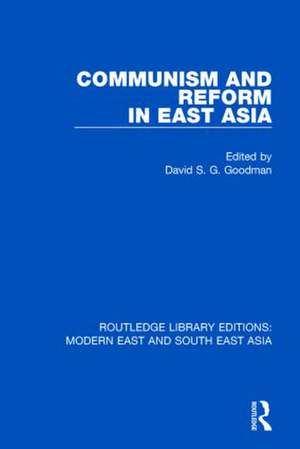Communism and Reform in East Asia: Routledge Library Editions: Modern East and South East Asia
Autor David Goodmanen Limba Engleză Paperback – 9 noi 2016
| Toate formatele și edițiile | Preț | Express |
|---|---|---|
| Paperback (1) | 237.02 lei 6-8 săpt. | |
| Taylor & Francis – 9 noi 2016 | 237.02 lei 6-8 săpt. | |
| Hardback (1) | 680.31 lei 6-8 săpt. | |
| Taylor & Francis – 15 apr 2015 | 680.31 lei 6-8 săpt. |
Preț: 237.02 lei
Preț vechi: 286.66 lei
-17% Nou
Puncte Express: 356
Preț estimativ în valută:
45.36€ • 47.18$ • 37.45£
45.36€ • 47.18$ • 37.45£
Carte tipărită la comandă
Livrare economică 14-28 aprilie
Preluare comenzi: 021 569.72.76
Specificații
ISBN-13: 9781138901346
ISBN-10: 1138901342
Pagini: 168
Dimensiuni: 156 x 234 mm
Greutate: 0.25 kg
Ediția:1
Editura: Taylor & Francis
Colecția Routledge
Seria Routledge Library Editions: Modern East and South East Asia
Locul publicării:Oxford, United Kingdom
ISBN-10: 1138901342
Pagini: 168
Dimensiuni: 156 x 234 mm
Greutate: 0.25 kg
Ediția:1
Editura: Taylor & Francis
Colecția Routledge
Seria Routledge Library Editions: Modern East and South East Asia
Locul publicării:Oxford, United Kingdom
Public țintă
Postgraduate and UndergraduateCuprins
1. Communism in East Asia: The Production Imperative, Legitimacy and Reform David S.G. Goodman 2. The Reform Process in the People’s Republic of China Tony Saich 3. Reform, Local Political Institutions and the Village Economy in China Elisabeth J. Croll 4. China: the New Inheritance Law and the Peasant Household Delia Davin 5. North Korea: the End of the Beginning Aidan Foster-Carter 6. Ideology and the Legitimation Crisis in North Korea James Cotton 7. Vietnam: the Slow Road to Reform Michael Williams 8. The Mongolian People’s Republic in the 1980s: Continuity and Change Judith Nordby 9. The Soviet Union and the Pacific Century Gerald Segal 10. China and the Asia-Pacific Region Michael B. Yahuda
Descriere
The West no longer regards communism in East Asia as a threat. On the contrary, because the communist party states of East Asia appear to be undergoing a process of reform directed primarily at economic modernization, it is now regarded as a potential market. The West’s attitude is reinforced by the recognition of East Asia’s economic importance more generally – a perception which in itself undoubtedly stimulated reform in the region’s communist party states. The causes, extent and consequences of reform in the East Asian communist party states are the concerns of the contributions to this volume, first published in 1988. It includes chapters on the reform process in China, North Korea, Vietnam and Mongolia; as well as examinations of the roles played by both China and the Soviet Union in the Asia-Pacific region. They demonstrate that a belief in a simple, single process of economic and political liberalization – brought about by the drive for economic modernization, the production imperative – is a misleading argument. Although the production imperative might act as a stimulus to reform, it is neither a sufficient nor even a necessary condition. In individual countries the communist party’s search for legitimacy, a change of leadership, or the relationship with the USSR have equally been the spur to reform. The drive for economic modernization may even be a consequence of the communist party’s desire to reform rather than a cause. The absence of a uniform pattern does not detract from the potential consequences of economic and political change. These challenge socialist thinking on the nature of collective life, ownership and rural society.






